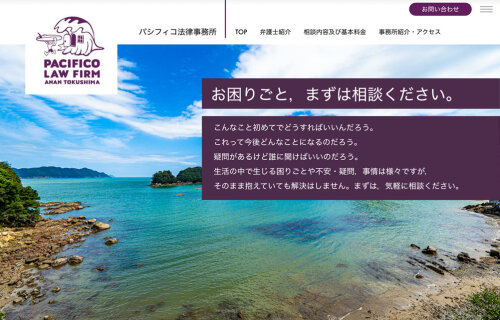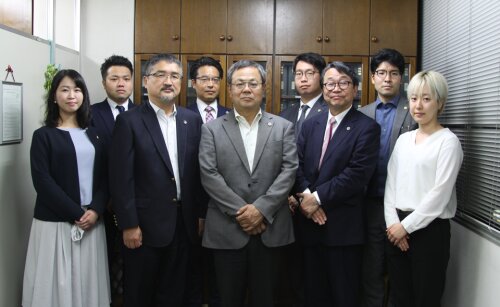Best Child Visitation Lawyers in Japan
Share your needs with us, get contacted by law firms.
Free. Takes 2 min.
Free Guide to Hiring a Family Lawyer
Or refine your search by selecting a city:
List of the best lawyers in Japan
About Child Visitation Law in Japan
Child visitation law in Japan is part of the family law system which regulates the rights and duties of parents following separation or divorce. Unlike some other countries where shared custody is more common, the Japanese legal system often awards sole custodianship to one parent, historically favoring the mother. However, both parents may have the right to visitation to maintain a relationship with their child. Visitation can be direct, meaning physical contact with the child, or indirect, such as exchanging letters, emails, or phone calls.
Why You May Need a Lawyer
There are several situations in which you may need legal assistance concerning child visitation in Japan:
- Disputes over Visitation Rights: If you are unable to reach an agreement with your co-parent on visitation, a lawyer can help mediate and negotiate terms.
- Enforcement of Visitation Orders: If your visitation rights are being obstructed, legal intervention may be necessary to enforce court decisions.
- Modification of Existing Orders: If circumstances change, such as relocation or changes in the child’s needs, a lawyer can help you modify existing visitation arrangements.
- Complex Custody Cases: In cases involving international parties or alleged abuse, professional legal guidance is crucial.
Local Laws Overview
Key aspects of child visitation laws in Japan include:
- Sole Custody Norm: Japanese law typically awards sole custody to one parent, but the other may have defined visitation rights.
- Diverse Visitation Arrangements: These can include regular visits, overnight stays, holiday schedules, and communication through electronic means.
- Court's Role: Family courts can help mediate disputes and issue binding visitation orders when parents cannot agree.
- Best Interest of the Child: Decisions are made considering the child's best interest, including emotional well-being and stability.
- International Considerations: Japan is a signatory to the Hague Convention on International Child Abduction, affecting cases where one parent might take a child abroad.
Frequently Asked Questions
What is the typical process to obtain visitation rights in Japan?
Generally, visitation is arranged through mutual agreement between parents. If no agreement can be reached, you may need to apply to the family court for a visitation order.
Can visitation rights be enforced?
Yes, but enforcement can be challenging. If one parent is unwilling to comply with the visitation order, the court can be asked to intervene, but Japan places emphasis on mutual cooperation rather than forceful measures.
Can grandparents or other relatives seek visitation rights?
In principle, visitation rights are primarily for the non-custodial parent. However, grandparents and other relatives can petition the family court, though success is less common.
Is legal representation required in family court proceedings?
While not mandatory, having a lawyer can significantly aid in navigating the legal system and advocating effectively for your visitation rights.
What factors do courts consider when determining visitation?
Court decisions are based on the child's best interest, considering factors such as age, school schedule, relationship with parents, and any potential risks.
Can visitation be denied?
Yes, visitation can be denied if the court believes this is in the child's best interest, for instance if there is a history of abuse or potential abduction risk.
How are visitation disputes typically resolved?
Many disputes are addressed through mediation, which the family court provides. If mediation fails, the court will issue a binding decision.
Are there any costs associated with applying for visitation rights?
Yes, there may be legal fees and court fees, though the exact amount can vary depending on the complexity of your case.
Can I alter my visitation schedule?
Changes to visitation arrangements can be made if both parents agree or through a court order if there are significant changes in circumstances.
What is indirect visitation?
Indirect visitation involves maintaining contact through letters, phone calls, or emails, typically when direct contact is not feasible or appropriate.
Additional Resources
For more information on child visitation in Japan, you may consider reaching out to the following resources:
- Family Court (家庭裁判所): Provides mediation and dispute resolution services.
- Japanese Federation of Bar Associations: Can help find legal representation.
- Child Guidance Centers (児童相談所): Offer support and advice to parents and children.
- International Social Service Japan: Assists with cross-border family matters.
Next Steps
If you need legal assistance with child visitation in Japan, here are some steps to consider:
- Consult a Lawyer: Seek out a lawyer specializing in family law to discuss your case specifics and get tailored advice.
- Gather Evidence: Compile any relevant documentation, such as communication records or previous court rulings, to support your case.
- Mediation: Attempt to resolve disputes through mediation services provided by the family court.
- Prepare for Court: If necessary, be ready to present your case in family court, using a lawyer to improve your chances of a favorable outcome.
Lawzana helps you find the best lawyers and law firms in Japan through a curated and pre-screened list of qualified legal professionals. Our platform offers rankings and detailed profiles of attorneys and law firms, allowing you to compare based on practice areas, including Child Visitation, experience, and client feedback.
Each profile includes a description of the firm's areas of practice, client reviews, team members and partners, year of establishment, spoken languages, office locations, contact information, social media presence, and any published articles or resources. Most firms on our platform speak English and are experienced in both local and international legal matters.
Get a quote from top-rated law firms in Japan — quickly, securely, and without unnecessary hassle.
Disclaimer:
The information provided on this page is for general informational purposes only and does not constitute legal advice. While we strive to ensure the accuracy and relevance of the content, legal information may change over time, and interpretations of the law can vary. You should always consult with a qualified legal professional for advice specific to your situation.
We disclaim all liability for actions taken or not taken based on the content of this page. If you believe any information is incorrect or outdated, please contact us, and we will review and update it where appropriate.
Browse child visitation law firms by city in Japan
Refine your search by selecting a city.
















